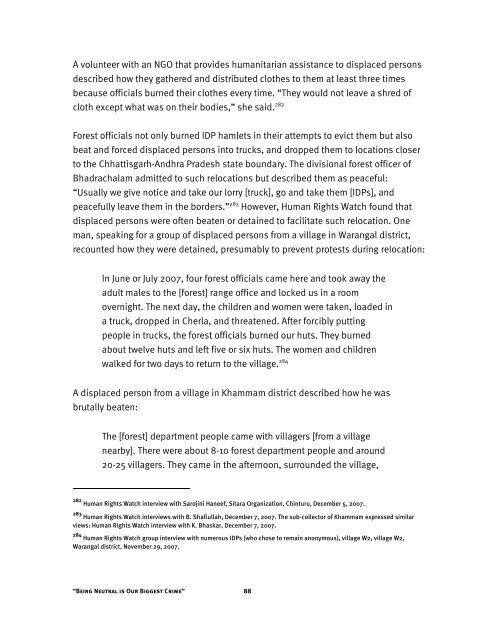âBeing Neutral is Our Biggest Crimeâ - Global Coalition to Protect ...
âBeing Neutral is Our Biggest Crimeâ - Global Coalition to Protect ...
âBeing Neutral is Our Biggest Crimeâ - Global Coalition to Protect ...
You also want an ePaper? Increase the reach of your titles
YUMPU automatically turns print PDFs into web optimized ePapers that Google loves.
A volunteer with an NGO that provides humanitarian ass<strong>is</strong>tance <strong>to</strong> d<strong>is</strong>placed persons<br />
described how they gathered and d<strong>is</strong>tributed clothes <strong>to</strong> them at least three times<br />
because officials burned their clothes every time. “They would not leave a shred of<br />
cloth except what was on their bodies,” she said. 282<br />
Forest officials not only burned IDP hamlets in their attempts <strong>to</strong> evict them but also<br />
beat and forced d<strong>is</strong>placed persons in<strong>to</strong> trucks, and dropped them <strong>to</strong> locations closer<br />
<strong>to</strong> the Chhatt<strong>is</strong>garh-Andhra Pradesh state boundary. The div<strong>is</strong>ional forest officer of<br />
Bhadrachalam admitted <strong>to</strong> such relocations but described them as peaceful:<br />
“Usually we give notice and take our lorry [truck], go and take them [IDPs], and<br />
peacefully leave them in the borders.” 283 However, Human Rights Watch found that<br />
d<strong>is</strong>placed persons were often beaten or detained <strong>to</strong> facilitate such relocation. One<br />
man, speaking for a group of d<strong>is</strong>placed persons from a village in Warangal d<strong>is</strong>trict,<br />
recounted how they were detained, presumably <strong>to</strong> prevent protests during relocation:<br />
In June or July 2007, four forest officials came here and <strong>to</strong>ok away the<br />
adult males <strong>to</strong> the [forest] range office and locked us in a room<br />
overnight. The next day, the children and women were taken, loaded in<br />
a truck, dropped in Cherla, and threatened. After forcibly putting<br />
people in trucks, the forest officials burned our huts. They burned<br />
about twelve huts and left five or six huts. The women and children<br />
walked for two days <strong>to</strong> return <strong>to</strong> the village. 284<br />
A d<strong>is</strong>placed person from a village in Khammam d<strong>is</strong>trict described how he was<br />
brutally beaten:<br />
The [forest] department people came with villagers [from a village<br />
nearby]. There were about 8-10 forest department people and around<br />
20-25 villagers. They came in the afternoon, surrounded the village,<br />
282 Human Rights Watch interview with Sarojini Haneef, Sitara Organization, Chinturu, December 5, 2007.<br />
283 Human Rights Watch interviews with B. Shafiullah, December 7, 2007. The sub-collec<strong>to</strong>r of Khammam expressed similar<br />
views: Human Rights Watch interview with K. Bhaskar, December 7, 2007.<br />
284 Human Rights Watch group interview with numerous IDPs (who chose <strong>to</strong> remain anonymous), village W2, village W2,<br />
Warangal d<strong>is</strong>trict, November 29, 2007.<br />
“Being <strong>Neutral</strong> <strong>is</strong> <strong>Our</strong> <strong>Biggest</strong> Crime” 88
















